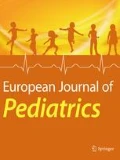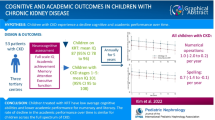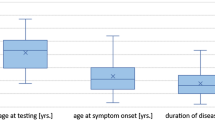Abstract
The intellectual status and professional careers of 51 young adults with phenylketonuria whose treatment started before 3 months of age are described. Their mean IQ was 97 (SD=16). Of the IQs, 4% were more than 2 SD below the norm. The distribution of types of schooling of the patients was comparable to that in the German population. The professional careers of nearly all the patients were according to their educational level. Within the sample the outcome was significantly correlated with phenylalanine (Phe) control, even when the patients’ social background was statistically taken into account. The main influence of Phe on intelligence seems to occur during the first decade of life since IQ data remain stable even after Phe levels increased during adolescence.
Similar content being viewed by others
Abbreviations
- Phe :
-
phenylalanine
- PKU :
-
phenylketonuria
References
Azen CG, Koch R, Friedman EG, Berlow St, Coldwell J, Krause W, Matalon R, McCabe E, et al (1991) Intellectual development in 12-year-old children treated for phenylketonuria. Am J Dis Child 145: 35–39
Beasley MG, Costello PM, Smith I (1994) Outcome of treatment in young adults with phenylketonuria detected by routine neonatal screening between 1964 and 1971. Q J Med 87: 155–160
Berry HK, O’Grady DJ, Perlmutter LJ, Bofinger MK (1979) Intellectual development and academic achievement of children treated early for phenylketonuria. Dev Med Child Neurol 21: 311–320
Holtzman NA, Kronmal RA, Doorninck W van, Azen CG, Koch R (1986) Effect of age at loss of dietary control on intellectual performance and behavior of children with phenylketonuria. N Engl J Med 314: 593–598
Koch R, Yusin M, Fishier K (1985) Successful adjustment to society by adults with phenylketonuria. J Inherited Metab Dis 8: 209–11
Koch R, Azen CG, Hurst N, Gross Friedman E, Fishier K (1987) The effects of diet discontinuation in children with phenylketonuria. Eur J Pediatr 146 [Suppl]: 12–16
Rupp A, Burgard P (1995) The comparison of different indices of dietary control in phenylketonuria. Acta Paediatr Scand 84: 521–527
Saudubray JM, Rey F, Ogier H, Abadie V, Farriaux JP, Ghisolfi J, Guibaud P, Rey J, Vidailhet M (1987) Intellectual and school performances in early-treated classical PKU patients. Eur J Pediatr 146 [Suppl 1]: A20-A22
Schmidt E, Rupp A, Burgard P, Weglage J, Sonneville L de (1994) Sustained attention in adult phenylketonuria: the influence of the concurrent phenylalanine-blood-level. J Clin Exp Neuropsychol 16 (5): 681–688
Schmidt H, Mahle M, Michel U, Pietz J (1987) Continuation versus discontinuation of low-phenylalanine diet in PKU adolescents. Eur J Pediatr 146 [Suppl 1]: 17–19
Seashore MR, Friedman E, Novelly RA, Bapat V (1985) Loss of intellectual function in children with phenylketonuria after relaxation of dietary phenylalanine restriction. Pediatrics 75: 226–32
Smith I, Lobascher ME, Stevenson JE, Wolff OH, Schmidt H, Grubel-Kaiser S, Bickel H (1978) Effect of stopping low-phenylalanine diet on intellectual progress of children with phenylketonuria. BMJ 2, 723–26
Smith I, Beaseley MG, Ades AE (1991) Effect on intelligence of relaxing the low phenylalanine diet in phenylketonuria. Arch Dis Child 65: 311–16
Statistisches Jahrbuch 1991(1991) Wiesbaden: Statistisches Bundesamt
Titze I, Tewes U (1984) Messung der Intelligenz bei Kindern mit dem HAWIK-R. Huber, Bern
Waisbren SE, Schnell RR, Levy HL (1980) Diet termination in children with phenylketonuria: a review of psychological assessments used to determine outcome. J Inherited Metab Dis 3: 149–53
Waisbren SE, Mahon BE, Schnell RR, Levy HL (1987) Predictors of intelligence quotient and intelligence quotient change in persons treated for phenylketonuria early in life. Pediatrics 79: 351–55
Weglage J, Flinders B, Wilken B, Schubert D, Ullrich K (1993) School performance and intellectual outcome in adolescents with phenylketonuria. Acta Paediatr Scand 81: 582–586
Author information
Authors and Affiliations
Rights and permissions
About this article
Cite this article
Schmidt, H., Burgard, P., Pietz, J. et al. Intelligence and professional career in young adults treated early for phenylketonuria. Eur J Pediatr 155 (Suppl 1), S97–S100 (1996). https://doi.org/10.1007/PL00014262
Issue Date:
DOI: https://doi.org/10.1007/PL00014262




